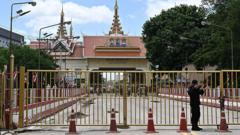The Thai Constitutional Court suspended PM Paetongtarn Shinawatra over a controversial phone call that raised public ire and challenged her governance, complicating the political landscape of Thailand.
Thai PM Paetongtarn Shinawatra Suspended Amid Leaked Call Controversy

Thai PM Paetongtarn Shinawatra Suspended Amid Leaked Call Controversy
Political tensions escalate as Thailand's prime minister faces potential dismissal following a leaked conversation.
In a dramatic turn of events, Thailand’s Constitutional Court has suspended Prime Minister Paetongtarn Shinawatra as it deliberates on a petition for her removal from office. The suspension follows the emergence of an audio clip in which she criticized a Thai military commander and addressed former Cambodian Prime Minister Hun Sen as "uncle," igniting public outrage and demands for her resignation.
This incident places Paetongtarn in an increasingly precarious position, potentially making her the third member of the influential Shinawatra family to be ousted from power in recent years. Compounding her troubles is a recent loss of a key conservative ally from her ruling coalition, leaving her government with a fragile majority.
The court, in a 7-2 vote, has granted her 15 days to respond to the dismissal petition, while the deputy prime minister assumes the role of acting leader. Despite her suspension, Paetongtarn has been reassigned as culture minister, a role she had just taken on earlier in the day.
In an attempt to mitigate backlash, she reiterated that the purpose of her call with Hun Sen was aimed at addressing longstanding border disputes, which have flared up again following recent violence. Her statements come in the face of stern criticism from conservative politicians who claim she is undermining military interests.
“I had no intent to do it for my own interest," Paetongtarn declared, asserting that her focus was on national stability and preventing loss of life. Should she ultimately be dismissed, she would join her predecessor, Srettha Thavisin, in having their prime ministerial tenure cut short by the court since last year.
Critics of the Constitutional Court argue that its growing influence poses a significant threat to democracy in Thailand, with claims that it is being used as a tool against political adversaries. The court has a history of dissolving political parties, exemplifying its capability to reshape the political landscape at will.
Although the suspension of the 38-year-old prime minister does raise significant concerns, she remains a pivotal figure in Thailand, being the youngest leader and only the second woman in office, following her aunt Yingluck Shinawatra. However, her approval ratings have plummeted substantially, highlighting the daunting challenges she faces in restoring public trust during her leadership.
Additionally, the troubles of the Shinawatra dynasty are not confined to Paetongtarn; her father, Thaksin Shinawatra, is simultaneously battling legal issues, having been charged with insulting the monarchy. His high-profile trial commenced on the same day as the court’s decision on Paetongtarn, adding another layer of complexity to an already turbulent political environment marked by power struggles and historical tensions between ruling factions and the military in Thailand.
This incident places Paetongtarn in an increasingly precarious position, potentially making her the third member of the influential Shinawatra family to be ousted from power in recent years. Compounding her troubles is a recent loss of a key conservative ally from her ruling coalition, leaving her government with a fragile majority.
The court, in a 7-2 vote, has granted her 15 days to respond to the dismissal petition, while the deputy prime minister assumes the role of acting leader. Despite her suspension, Paetongtarn has been reassigned as culture minister, a role she had just taken on earlier in the day.
In an attempt to mitigate backlash, she reiterated that the purpose of her call with Hun Sen was aimed at addressing longstanding border disputes, which have flared up again following recent violence. Her statements come in the face of stern criticism from conservative politicians who claim she is undermining military interests.
“I had no intent to do it for my own interest," Paetongtarn declared, asserting that her focus was on national stability and preventing loss of life. Should she ultimately be dismissed, she would join her predecessor, Srettha Thavisin, in having their prime ministerial tenure cut short by the court since last year.
Critics of the Constitutional Court argue that its growing influence poses a significant threat to democracy in Thailand, with claims that it is being used as a tool against political adversaries. The court has a history of dissolving political parties, exemplifying its capability to reshape the political landscape at will.
Although the suspension of the 38-year-old prime minister does raise significant concerns, she remains a pivotal figure in Thailand, being the youngest leader and only the second woman in office, following her aunt Yingluck Shinawatra. However, her approval ratings have plummeted substantially, highlighting the daunting challenges she faces in restoring public trust during her leadership.
Additionally, the troubles of the Shinawatra dynasty are not confined to Paetongtarn; her father, Thaksin Shinawatra, is simultaneously battling legal issues, having been charged with insulting the monarchy. His high-profile trial commenced on the same day as the court’s decision on Paetongtarn, adding another layer of complexity to an already turbulent political environment marked by power struggles and historical tensions between ruling factions and the military in Thailand.



















